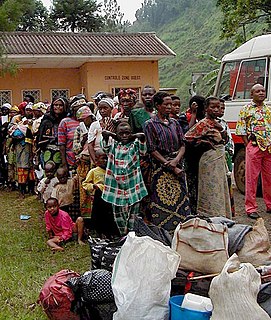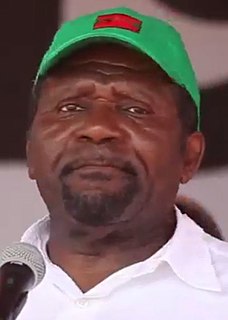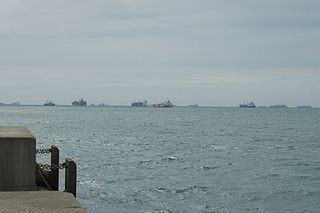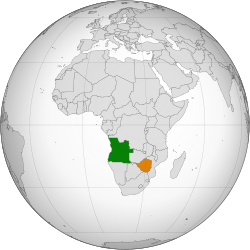
The economy of Angola remains heavily influenced by the effects of four decades of conflict in the last part of the 20th Century, the war for independence from Portugal (1961–75) and the subsequent civil war (1975–2002). Despite extensive oil and gas resources, diamonds, hydroelectric potential, and rich agricultural land, Angola remains poor, and a third of the population relies on subsistence agriculture. Since 2002, when the 27-year civil war ended, government policy prioritized the repair and improvement of infrastructure and strengthening of political and social institutions. During the first decade of the 21st Century, Angola was one of the fastest-growing in the world, with reported annual average GDP growth of 11.1 percent from 2001 to 2010. High international oil prices and rising oil production contributed to strong economic growth, although with high inequality, at that time. Corruption is rife throughout the economy and the country remains heavily dependent on the oil sector, which in 2017 accounted for over 90 percent of exports by value and 64 percent of government revenue. With the end of the oil boom, from 2015 Angola entered into a period of economic contraction.

After independence in 1964 the foreign relations of Zambia were mostly focused on supporting liberation movements in other countries in Southern Africa, such as the African National Congress and SWAPO. During the Cold War Zambia was a member of the Non-Aligned Movement.

Angola is a country in southwestern Africa. The country's name derives from the Kimbundu word for king. It was first settled by San hunter-gatherer societies before the northern domains came under the rule of Bantu states such as Kongo and Ndongo. From the 15th century, Portuguese colonists began trading, and a settlement was established at Luanda during the 16th century. Portugal annexed territories in the region which were ruled as a colony from 1655, and Angola was incorporated as an overseas province of Portugal in 1951. After the Angolan War of Independence, which ended in 1974 with an army mutiny and leftist coup in Lisbon, Angola achieved independence in 1975 through the Alvor Agreement. A few months before independence, Angola entered a period of civil war that lasted until 2002.

The National Union for the Total Independence of Angola is the second-largest political party in Angola. Founded in 1966, UNITA fought alongside the Popular Movement for the Liberation of Angola (MPLA) in the Angolan War for Independence (1961–1975) and then against the MPLA in the ensuing civil war (1975–2002). The war was one of the most prominent Cold War proxy wars, with UNITA receiving military aid initially from People's Republic of China from 1966 until October 1975 and later from the United States and apartheid South Africa while the MPLA received support from the Soviet Union and its allies, especially Cuba.

The Second Congo War began in the Democratic Republic of the Congo in August 1998, little more than a year after the First Congo War, and involved some of the same issues. The war officially ended in July 2003, when the Transitional Government of the Democratic Republic of the Congo took power. Although a peace agreement was signed in 2002, violence has continued in many regions of the country, especially in the east. Hostilities have continued since the ongoing Lord's Resistance Army insurgency, and the Kivu and Ituri conflicts.

Isaías Henrique Ngola Samakuva is an Angolan politician who was the President of the National Union for the Total Independence of Angola (UNITA) from June 2003 to November 2019.

The Angolan Civil War was a civil war in Angola, beginning in 1975 and continuing, with interludes, until 2002. The war began immediately after Angola became independent from Portugal in November 1975. The war was a power struggle between two former anti-colonial guerrilla movements, the communist People's Movement for the Liberation of Angola (MPLA) and the anti-communist National Union for the Total Independence of Angola (UNITA). The war was used as a surrogate battleground for the Cold War by rival states such as the Soviet Union, Cuba, South Africa and the United States.
The Frontline States (FLS) were a loose coalition of African countries from the 1960s to the early 1990s committed to ending apartheid and white minority rule in South Africa and Rhodesia. The FLS included Angola, Botswana, Lesotho, Mozambique, Tanzania, Zambia, and Zimbabwe. The FLS disbanded after Nelson Mandela became President of South Africa in 1994.
The following lists events that happened during 1998 in Zimbabwe.
The Lusaka Protocol, initialed in Lusaka, Zambia on October 31, 1994, attempted to end the Angolan Civil War by integrating and disarming UNITA and starting national reconciliation. Both sides signed a truce as part of the protocol on November 15, 1994, and the treaty was signed on November 20, 1994.
The Lusaka Ceasefire Agreement attempted to end the Second Congo War through a ceasefire, release of prisoners of war, and the deployment of an international peacekeeping force under the auspices of the United Nations. The heads of state of Angola, the Democratic Republic of the Congo, Namibia, Rwanda, Uganda, Zambia, and Zimbabwe signed the agreement in Lusaka, Zambia on July 10, 1999.
The 2000s in Angola saw the end of a 27-year-long civil war (1975–2002) and economic growth as foreign nation's began to invest in Angola's untapped petroleum reserves. The government continues to resettle internally displaced persons as its economy recovers and expands.
Democratic Front of Cabinda is a separatist rebel group that fights for the independence of Cabinda province from Angola.

Relations between Angola and South Africa in the post-apartheid era are quite strong as the ruling parties in both states, the African National Congress in South Africa and the MPLA in Angola, fought together during the Angolan Civil War and South African Border War. They fought against UNITA rebels, based in Angola, and the apartheid-era government in South Africa which supported them. Nelson Mandela mediated between the MPLA and UNITA during the final years of the Angolan Civil War. Although South Africa was preponderant in terms of relative capabilities during the late twentieth century, the recent growth of Angola has led to a more balanced relation.
In the 1990s in Angola, the last decade of the Angolan Civil War (1975–2002), the Angolan government transitioned from a nominally communist state to a nominally democratic one, a move made possible by political changes abroad and military victories at home. Namibia's declaration of independence, internationally recognized on April 1, eliminated the southwestern front of combat as South African forces withdrew to the east. The MPLA abolished the one-party system in June and rejected Marxist-Leninism at the MPLA's third Congress in December, formally changing the party's name from the MPLA-PT to the MPLA. The National Assembly passed law 12/91 in May 1991, coinciding with the withdrawal of the last Cuban troops, defining Angola as a "democratic state based on the rule of law" with a multi-party system.

United Nations Security Council resolution 976, adopted unanimously on 8 February 1995, after reaffirming resolutions 696 (1991) and all subsequent resolutions on Angola, the Council authorised the establishment of a new peacekeeping mission in the country, the United Nations Angola Verification Mission III with an initial mandate ending on 8 August 1995.

United Nations Security Council resolution 1135, adopted unanimously on 29 October 1997, after reaffirming Resolution 696 (1991) and all subsequent resolutions on Angola, the Council extended the mandate of the United Nations Observer Mission in Angola (MONUA) until 30 January 1998 and urged UNITA to comply with previous resolutions, particularly as sanctions were due to come into effect.

Corruption in Zimbabwe has become endemic within its political, private and civil sectors. Zimbabwe ranks joint 160th out of 180 countries in the 2016 Transparency International Corruption Perceptions Index. On a scale of 0 to 100, the Corruption Perceptions Index marked Zimbabwe 22. This marks an increase in corruption since 1999, when the country ranked 4.1.
The following lists events that happened during 1998 in the Democratic Republic of the Congo.
Zimbabwe Defence Industries (Pvt) Ltd (ZDI) is a state-owned Zimbabwean arms manufacturing and procurement company headquartered in Harare, with a primary focus on sporting and military ammunition. In the past it has also manufactured mortar rounds, land mines, and light armoured fighting vehicles such as the Gazelle FRV. During the late 1990s, ZDI was involved in brokering major arms deals between China and other African governments such as the Republic of the Congo. The subsequent economic depression in Zimbabwe, as well as the collapse of the Zimbabwean dollar against major world currencies, have forced ZDI to limit its activity to exporting second-hand equipment from the Zimbabwe Defence Forces.













